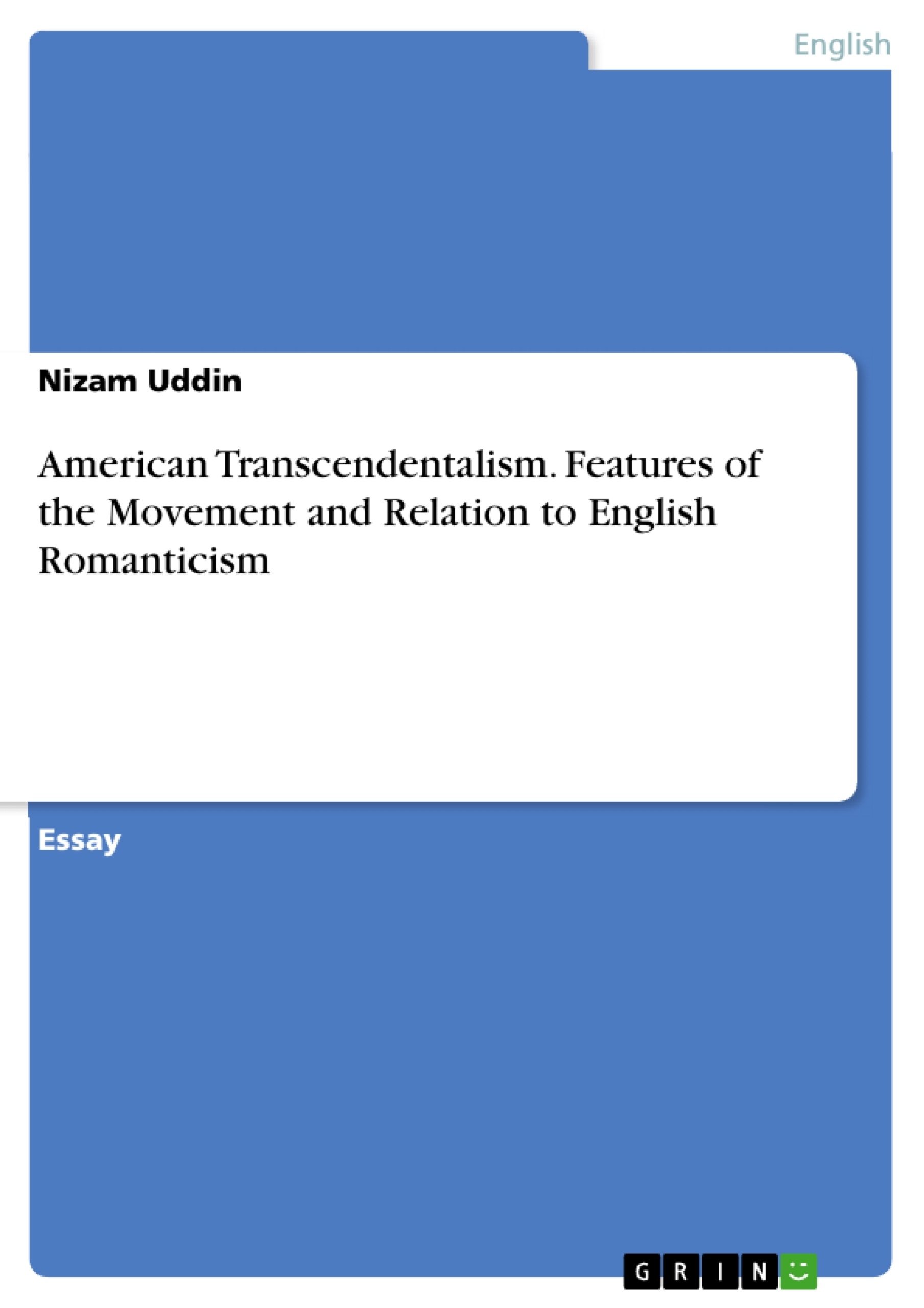This essay provides insight into two important social ideals in the 19th century - the american transcendentalism and, by comparison, the english romanticism. The fokus will hereby be on the former, while the latter will provide a source of delineating characteristics established through contrasting both against each other.
To fully enclose the concept of american transcendentalism, the essay will examine both the religious and philosophical as well as the literary and general cultural aspects of the movement.
Table of Contents
- What do you understand by American Transcendentalism? Discuss the features of the movement with its relation to the English Romanticism?
- Defining Transcendentalism
- What was American Transcendentalism?
- American Transcendentalism as a Religious movement
- American Transcendentalism as a Philosophical movement
- American Transcendentalism as a Literary movement
- American Transcendentalism as a Cultural movement
- The features of the American Transcendentalism with its relation to the English Romanticism
- Religion
- The Source of Goodness
- Writing Style
Objectives and Key Themes
This article aims to define American Transcendentalism and explore its features in relation to English Romanticism. It investigates the movement's religious, philosophical, literary, and cultural aspects.
- Definition and interpretation of American Transcendentalism
- Comparison and contrast between American Transcendentalism and English Romanticism
- The religious underpinnings of Transcendentalism and its critique of Calvinism
- The philosophical influences on Transcendentalism, particularly Kant and its divergence from Empiricism
- The impact of Transcendentalism on American literature and culture
Chapter Summaries
Defining Transcendentalism: This section grapples with the complex definition of Transcendentalism, highlighting its varied interpretations. It explains the term's core meaning—a belief in a divine world beyond sensory experience—accessible through intuition and a connection with nature. The section emphasizes the transcendentalists' synthesis of various religious scriptures, culminating in the belief that union with the ultimate being is humanity's central goal.
What was American Transcendentalism?: This chapter comprehensively analyzes American Transcendentalism as a multifaceted movement encompassing religious, philosophical, literary, and cultural aspects. The religious aspect critiques Calvinism's deterministic view of humanity, advocating for human potential and a more liberal interpretation of Christianity. Philosophically, it examines the influence of Kant's transcendental idealism in contrast to Locke's empiricism, highlighting the movement's emphasis on intuition and revelation. The literary impact is discussed through the role of writers as seers, promoting social justice and individual expression. Finally, it explores Transcendentalism's pervasive cultural influence, shaping intellectual life in America, despite its relatively short lifespan as an organized movement.
The features of the American Transcendentalism with its relation to the English Romanticism: This section compares and contrasts American Transcendentalism and English Romanticism, highlighting similarities in their reactions against rigid traditions and emphasis on individual experience and nature's inspiration. However, key differences are noted regarding their approaches to religion (Transcendentalism's focus on a personal, spiritual understanding of God versus Romanticism's more individualistic perspective), the source of goodness (inner light versus nature), and writing styles (Transcendentalism's thematic unity versus Romanticism's stylistic diversity).
Keywords
American Transcendentalism, English Romanticism, Calvinism, Unitarianism, Immanuel Kant, John Locke, Intuition, Religion, Philosophy, Literature, Culture, Individualism, Nature, Spirituality, Social Reform.
American Transcendentalism: A Comprehensive Overview - FAQ
What is American Transcendentalism?
American Transcendentalism was a multifaceted intellectual and cultural movement of the early 19th century. It encompassed religious, philosophical, literary, and cultural aspects, emphasizing individual intuition, the inherent goodness of humanity, and a spiritual connection with nature. It's characterized by a belief in a divine world beyond sensory experience, accessible through intuition and connection with nature. The central goal is union with the ultimate being.
How does American Transcendentalism relate to English Romanticism?
Both movements reacted against rigid traditions and emphasized individual experience and nature's inspiration. However, key differences exist. Transcendentalism focused on a personal, spiritual understanding of God, contrasting with Romanticism's more individualistic perspective. Their sources of goodness also differed: inner light for Transcendentalism versus nature for Romanticism. Finally, their writing styles varied, with Transcendentalism favoring thematic unity and Romanticism showcasing stylistic diversity.
What are the key philosophical influences on Transcendentalism?
Transcendentalism was significantly influenced by Immanuel Kant's transcendental idealism, contrasting with John Locke's empiricism. The movement emphasized intuition and revelation over sensory experience as a means of understanding the world and one's place within it. It also presented a critique of Calvinism's deterministic view of humanity.
What is the religious aspect of American Transcendentalism?
The religious aspect of Transcendentalism offered a critique of Calvinism, advocating for human potential and a more liberal interpretation of Christianity. It emphasized a personal and intuitive relationship with God, moving away from strict theological doctrines. Influences included Unitarianism and various religious scriptures.
What was the impact of Transcendentalism on American literature and culture?
Transcendentalism profoundly impacted American literature and culture, shaping intellectual life despite its relatively short lifespan as an organized movement. Transcendentalist writers were seen as seers promoting social justice and individual expression. The movement's emphasis on individualism, nature, and spirituality continues to resonate in American thought and culture.
What are the main themes explored in this overview of American Transcendentalism?
This overview explores the definition and interpretation of American Transcendentalism, comparing and contrasting it with English Romanticism. It delves into the movement's religious underpinnings (particularly its critique of Calvinism), philosophical influences (Kant and the divergence from Empiricism), and its significant impact on American literature and culture.
What are some key words associated with American Transcendentalism?
Key words associated with American Transcendentalism include: American Transcendentalism, English Romanticism, Calvinism, Unitarianism, Immanuel Kant, John Locke, Intuition, Religion, Philosophy, Literature, Culture, Individualism, Nature, Spirituality, and Social Reform.
- Quote paper
- Nizam Uddin (Author), 2016, American Transcendentalism. Features of the Movement and Relation to English Romanticism, Munich, GRIN Verlag, https://www.grin.com/document/428498




